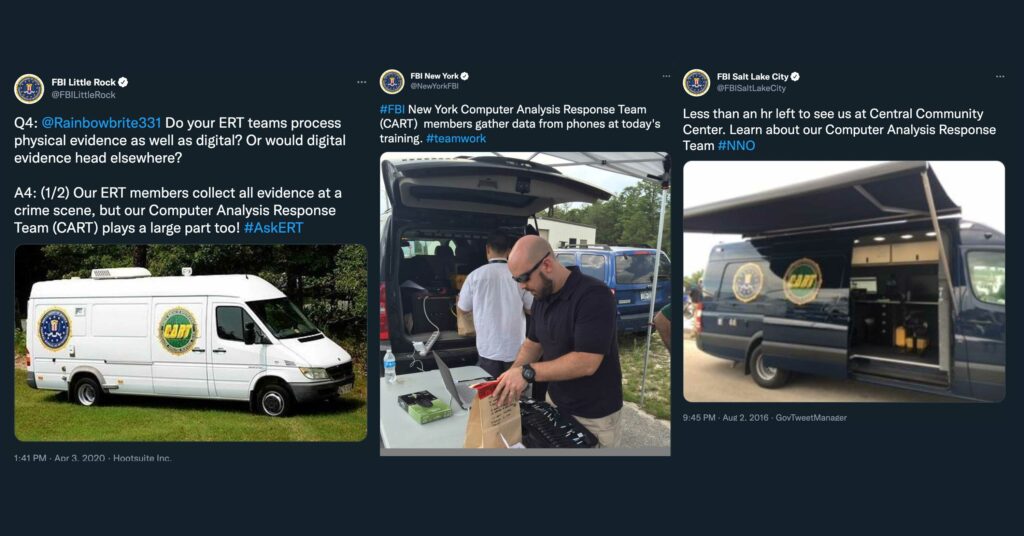Government Surveillance, Privacy & Data, Reproductive Rights
Cracking Down on Federal Aid for Reproductive Health Surveillance: The Computer Analysis Response Team
This is the fourth in a series of blog posts examining how the federal government and the White House — which has pledged to fight the criminalization of abortion — can prevent federal surveillance assistance to state and local law enforcement from being used to investigate and prosecute reproductive health care choices.
Previous posts looked at Regional Computer Forensic Laboratories (where federal officials help state and local law enforcement to access and analyze electronic devices), the National Domestic Computer Assistance Center (a federal entity that helps local law enforcement collect communications content and other records from companies), and fusion centers (hubs across the country that intake immense amounts of data and distribute it to other law enforcement entities, with significant federal funding and access to federal law enforcement information).
The FBI’s Computer Analysis Response Team (CART) is a component of the agency designed to provide digital forensics support across the country. Established in 1992, CART has become increasingly important given the proliferation of electronic devices, and frequency of digital data providing key evidence for investigators.CART staff conduct a wide range of digital forensic activities. They can help extract digital evidence — including from devices that have been locked or damaged — as well as sort through complex digital files and provide data in a format that is useful for law enforcement. The FBI lists the range of sources from which CART officials pull digital evidence as including “Mobile Devices; Cloud Technology; Internet of Things (IoT) Devices; Vehicles; Drones; Security Camera Footage; Desktop & Laptop Computers; Digital Cameras; DVR; Loose Media.” After conducting digital forensic examinations and obtaining evidence from electronic devices, CART officials will also testify in court about their findings.
Overall CART performs many of the same functions that Regional Computer Forensic Laboratories perform; indeed, some CART staff are stationed at these facilities. The most notable distinction is the breadth of the assistance that CART provides to state and local law enforcement. Whereas Regional Computer Forensic Laboratories provide assistance only to entities that are partners of the lab, CART is positioned to provide aid across the country to any state or local law enforcement official who seeks it out. According to a report from the Center for Strategic and International Studies, CART has over 500 hundred agents, as well as hundreds of analysts and support staff located in the FBI’s 56 field offices and FBI headquarters. The FBI describes CART as the “go-to force in the FBI for providing digital forensic services for both agency investigations and local, state, and federal partner investigations.” (emphasis added)In addition to offering services at field offices and by having local law enforcement relay requests to staff at FBI headquarters, CART even possesses a fleet of 18 “mobile labs” that can go to crime scenes and provide analysis on site.

As a result of how broadly CART officials are available, they are highly relied upon for digital forensic support. According to the Center for Strategic and International Studies, 45 percent of law enforcement professionals seeking assistance with digital evidence go to FBI field offices for aid, an even larger portion than those that use Regional Computer Forensic Laboratories (33 percent according to the same study).
The FBI boasts that CART staff assist law enforcement to “help solve crimes ranging from cybercrimes and computer intrusions to violent crimes, financial crimes, organized crimes, and national security matters,” but it is easy to predict how its digital forensic services could be used for investigation of unlawful abortions. CART staff could help unlock and retrieve files from women’s phones to review text messages, browsing activity, or app data. Location data could be pulled from a vehicles’ navigation system or device apps to map out movements to a clinic. A CART mobile lab could even be brought to the office of a doctor suspected of performing unlawful abortions to collect and sort files from their computers or server on site.
As CART are federal staff, the FBI and the administration have the ability to set policy guidelines on what assistance they can render, and what types of investigations they can work on. The Bureau should enact new policy guidelines, limiting the type of state and local investigations that CART officials (as well as other staff at FBI field offices and headquarters) can support. Specifically, it should mandate that staff will only support state and local investigations if requests for support include a certification that the investigation is not related to abortion.


